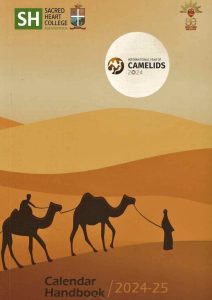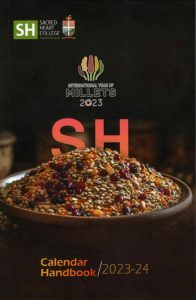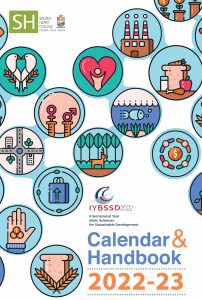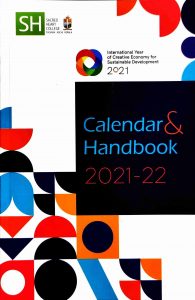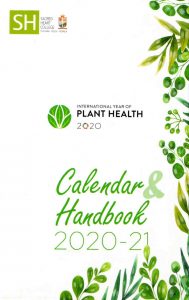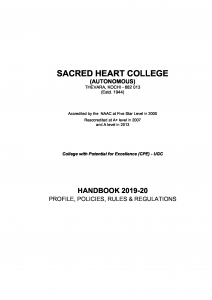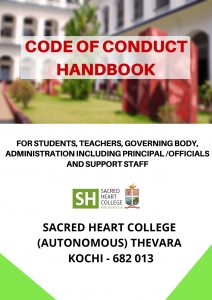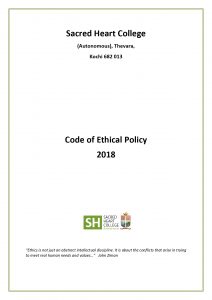- About
- Vision and Mission
- Objectives and Functions
- Quality Policy
- Strategies
- Accreditation & Rankings
- NAAC
- Distinctiveness
- Best Practices
- Institution Values
- Minutes of Meetings
- Reports
- Handbook
- Quality Initiatives
- Members & Contacts
- Undertaking
- Strategic Plan Documents
- Code of Conduct
Internal Quality Assurance Cell
In order to improve the quality of education in higher educational centres the NAAC has proposed all accredited higher educational institutions to form Internal Quality Assurance Cells (IQAC) to monitor the quality improvement initiatives of the institution. This is to ensure that the long-term objectives of the institution are fulfilled in a time-bound manner.
Vision
The Internal Quality Assurance Cell (IQAC) of Sacred Heart College, Thevara addresses and monitors the quality parameters of the college and ensures that the standards of excellence reflected in the vision and mission of the college are met and sustained.
Mission
To ensure and sustain quality, integrity and output.
Cultivate, enhance and disseminate knowledge by facilitating the required resources in time to excel in academic and professional pursuits.
Graduate Attributes
- Faith in God and faith in oneself
- Physical and mental fitness
- Self-awareness and emotional intelligence
- Intercultural and ethical competency evidenced through a readiness to serve humanity (SH) & planet
- Critical thinking, problem solving and research aptitude
- Deep discipline knowledge
- Readiness to take the first step (leadership)
- Teamwork and communication skills (career readiness)
Objectives
- Coordinate quality-related activities by developing an organised methodology of documentation and internal communication
- Integrating the activities of the College to ensure adoption and dissemination of good practices.
- Spearheading the conduct of internal and external Academic Audits of departments to promote quality, accountability and transparency.
- Creating and maintaining a system of feedback on processes and policies of the College from stakeholders.
- Initiating and coordinating the process of restructuring the syllabus to create a progressive curriculum that is in tune with the demands of the time.
- Preparing the Annual Quality Assurance Report (AQAR) as per NAAC guidelines
Functions
- Undertaking the role of a nodal agency for setting and applying quality parameters for various academic and administrative activities in the institution
- Providing the environment for a learner-centric education by participatory teaching and learning constructive for quality education
- Ensuring that the quality of education offered is effective , efficient and in need with the time
- Coordinating special programmes for advancing the career prospects of the faculty members and enhancing their competencies
- Spearheading the conduct of internal and external academic audits of the departments to promote accountability, quality and transparency.
- Organizing workshops, seminars and conferences for the proliferation and sharing of knowledge on significant themes and contemporary issues
- Documenting the progress and setting up of various programmes/activities conducted in the institution
- Establishing procedures and modalities to collect data and information on the various aspects of the functioning of the institution and progress of its students
- Coordinating the process of restructuring the syllabi of various programmes to ensure a progressive curriculum in tune with the demands of the time
- Organizing special programs for advanced learners and slow learners to motivate them in academic performances and to provide better opportunities to develop their skills
- Maintaining the credibility of evaluation procedures and ensuring timely declaration of results.
- Developing and managing the institutional database with the principle of quality maintenance
- Collaborating and networking with various national and international institutions and industries
- Drafting and submitting the Annual Quality Assurance Report (AQAR) as per the guidelines prescribed by NAAC
- Maintaining an effective feedback system from students, parents and stakeholders on the progress of the institution
Quality Policy
Sacred Heart College aims at creation of an ‘enlightened society’ through ‘the pursuit of wisdom with a righteous heart’ (Cor Rectum Inquirit Scientiam) after the Sacred Heart of Jesus.
For this, the Management and the staff are committed to providing a holistic education to the students through an empowering process of participation of various stakeholders in adequate measure.
The efforts will be to orientate entire teaching-learning-evaluation process as linked to the goals of higher education, national goals and the core values of the college as spelt out in its vision and mission. Towards attaining this college shall adopt OBE (outcome based education) by 2021. Quality policy envisages that the prescribed syllabus is covered in time, with adequate stress on skill development and societal application through an enabling inter-disciplinary teaching-learning environment having its foundation on the twin principles of faith in God with due respect for all (faiths) and a spirit of enquiry.
The process of learning is intended to instill in the academic community a concern for knowledge beyond boundaries and a concern for planet and people.
As part of the quality policy, there shall be a provision to receive suggestions (suggestion box, digital suggestion box) and redress grievances. Complaints regarding facilities can be registered with the College office.
Complaints regarding facilities shall be dealt with in a matter of one week, and grievances shall be addressed without delay, through the established channel.
As part of the quality policy, there shall be a students’ charter, which the authorities shall strive to fulfill.
STRATEGIES
- Ensuring updated and optimum methods of teaching, learning and evaluation
- Disseminating knowledge and research in the academia
- Fostering global competencies among students
- Contributing to national development
- Facilitating ICT enabled platforms with increased options and resources for learning and infrastructure facilities
- Guaranteeing access and affordability of various academic programmes to different sections of the society
SACRED HEART COLLEGE(C-11708)
| IIQA Submitted Date | 02/03/2020 |
| IIQA Status | Approved |
| SSR Submitted Date | 23/04/2021 |
| SSR Status | Final Grade Declared (3.503) |
Current Assessment Information
IIQA Information: Click Here
SSR Information: Click Here
Peer Team Report: Click Here
Grade Sheet: Click Here
Previous Assessment Information
Distinctive Feature: Dissemination of a Sustainable Life Style
As early as in the 1990s the think-tank of the college began discussing the implications of the fast-paced degradation of the natural environment and it felt that the academies had a role in sensitising the younger generation on the need to conserve nature through individual and collective action. Accordingly, in its 2005 review of the Vision and Mission statement, the college added to its mission the task of cultivating among the students “a concern for the environment.” Subsequently, the college drafted an Environment Policy (the first of its kind in Kerala) focussing on creating awareness about conservation and the propagation the philosophy “reduce, reuse and recycle”.
In its Environment Policy the college commits itself to the protection of life on the planet (a reiteration of the Green Spirituality of the CMI); reduction of waste in life; thoughtful use of earth’s resources; use of renewable energy, protection and promotion of biodiversity, and entrepreneurial efforts which can provide alternatives to the energy-intensive, resource-consuming technologies.
Over the past decade, the college has made systematic efforts to engage the students with its environment policy through programmes and projects that would inspire them to review their own lifestyle and environmental habits and inspiring others to care for nature through curricular as well as co-curricular means.
Department of Environmental Studies: The Department of Environmental Studies was started in the college in 2016 as a response to the growing need for experts in the field of Environmental Science. Besides offering a Master’s programme the department initiated in 2017-18, a mandatory add-on course in Environmental Studies for all UG students. Apart from the curriculum-based dissemination of environmental awareness, the college has also formed a set of fora for carrying the mission forward.
Solar Powered: The College is a pioneer in the field of nonconventional energy generation in this part of the country. Mithradham, the non-conventional research centre located in Aluva is an offshoot of this initiative by the college. The college has set up wind and solar energy generation units for its own power needs. In 2005, the college installed two on-grid solar-units with 33kw capacity with an output of approximately 140 units per day. In 2019, the college installed a 130 Kw solar power unit making the college one of the first in Kerala to go 100% solar.
Nature Club of the college with its 100 plus members organises various environment sensitisation programmes. One of the significant projects undertaken by the Club is the conservation of the mangroves in the neighbourhood, which was facing extinction in the late 1990s. The intervention of the Club helped not only the revival of the mangrove forest in the area but it also evoked public interest in conserving the mangroves. Moreover, the club has acted as the main arms of the extension activities of the college.
Bhoomitrasena (friends of the earth): works in tandem with the Nature Club. It focuses on reducing the impact of human activities on the environment. The activities include imparting training in sustainable waste management for households, public and private health, periodical cleaning drives, especially, of public places.
Biodiversity Centre: In order to sensitise the students to the significance of biodiversity the college established a centre in a nearby village, Arayankavu. Being a biological hotspot with a large variety of birds and butterflies, the centre has become the cynosure of the enthusiasts of ornithology, trekking and plant taxonomists.
Agri-club: Kerala is heavily dependent on other states for good grains despite the fact that large swathes of arable land are lying fallow. Taking cognizance of the need to revive farming, the college has taken the lead through its Agri-club to evoke interest among the students in farming and agri-business. For this purpose, the college has established an extension centre with 4-acre land attached to its biodiversity centre at Arayankavu Thottara Puncha.
Impact of the Programme
Student Orientation: With the help of the manifold sensitisation programmes the college has virtually turned the campus free of single-use plastic, disposable paper cups and plates. The club encourages the staff and students to use public transport and bicycle.
College Community: The initiatives in generating renewable energy has significantly reduced the monthly energy cost of the college besides reducing the environmental impact of power plants.
Community Orientation: The activities Bhoomitrasena and Nature club have also drawn a great deal of public attention. It has encouraged the local communities to come in support the efforts of the students through mobilising material and monetary support. The organic farming methods adopted by the college team has had a significant impact on the local communities. After a long interval, the local farmers have started cultivation and revived a good part of the fallow land.
National Mission: The activities under this programme address the National Mission such as Swatch Bharat, National Solar Mission, National Mission for Sustainable Agriculture, and the National Mission for Green India. Sacred Heart College was one of the first to take a decisive step in the dissemination of the values of environment protection by introducing a compulsory course in Environmental studies. The Hon’ble Supreme Court’s direction to incorporate a core course on environmental awareness is a vindication of the initiative taken by the college.
UN Sustainable Development Goals: An important aspect of these manifold activities is that they are in tune with the Sustainable Development Goals (SDG) of the UN, especially with respect to goals such as affordable clean energy, clean water and sanitation, good health and wellbeing, sustainable cities and communities, responsible consumption and production, climate action and life on land.
Awards and Recognitions
For its leadership in creating awareness about environment among the youth, the College has won several accolades including:
Paristhiti Mitra-2016 by CEERD, St. Stephen’s College, Uzhavoor
Best Campus award-2016 by Agri-Horticultural Society
Best College Award-2018 by Kerala Bio-diversity board (Rs.50000);
Biodiversity Award
The Principal is the chairman of Organic Kerala; an expert on Social Impact Assessment of development projects of Ernakulam, and Swachch Campus of UGC.
Best Practice I: Service Learning
The mission statement of Sacred Heart College emphasises four core values – holistic development, nation building, progress of humanity, and the dissemination of knowledge. With these objectives the college has designed a platform – for learning through civic engagement – called Service Learning Programme. The Programme is conceived as a sensitising project wherein all undergraduates are to do a minimum of 40 hours of mandatory social service.
Objectives
To encourage physical and mental well-being and to take joy in effort.
To enable them to relate the knowledge gained to the real life situations
To build sensitivity towards fellow beings and the environment
To assist the local community
To encourage cleanliness and the preservation of the natural environment.
| Scheme | |||
| Category | Duration | Weightage | Credits |
| UG Students | 40 – 500 hours | 1.5 weight for Manual work / Hour | 1 Extra Credit |
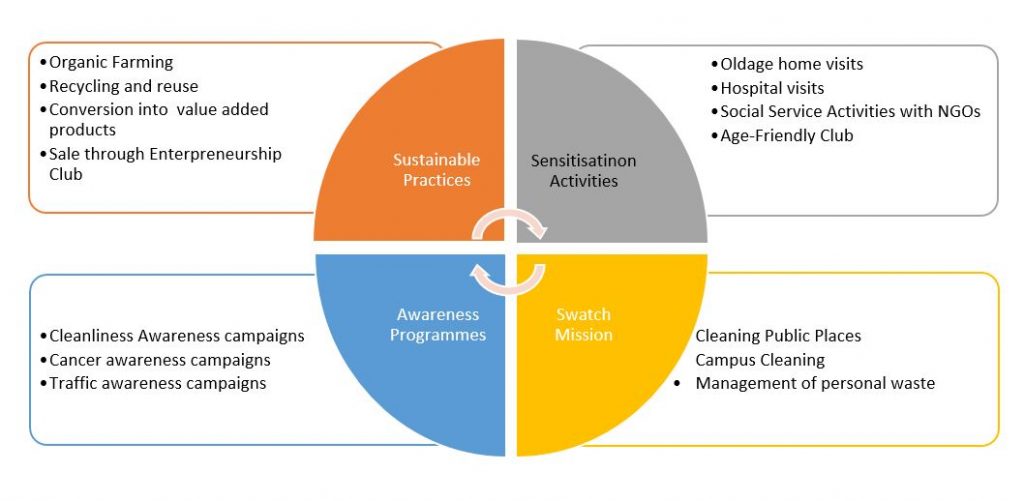
The Context
The rapid urbanisation and the rising trend of consumerism are steadily turning the state into a feedlot where the young people grow up with little awareness of the human effort behind the items they consume, especially the agricultural products. Similarly, the race for success and self-aggrandisement are turning the youth apathetic towards the disadvantaged communities. As an institution founded on the Christian values of love and service, the college considers as its mission to instil in the students a caring attitude not only to fellow human beings, especially those underprivileged, but also to all life forms around them. This includes the caring of the environment and sustainable practises in agriculture.
The multi-pronged-programme launched by the college is an exercise in experiential learning. Is has taken Sustainable practises, Sensitisation activities, Awareness programmes and Swatch mission as its core areas service.
The Practice
Sensitisation Drive
The student groups visit old-age homes; destitute/isolation wards and child cancer wards of hospitals periodically. Another initiative is “u3a” to train the elderly in computer, internet, smart phones, paper bag making etc.
Awareness Campaigns
Our volunteers organise cancer awareness classes with the support of medical practitioners. Periodical health check-up for the detection of cancer and lifestyle diseases, eye diseases etc., are held.
Swatch Bharat
Weekly cleaning drives of public places, including the removal of litter and plastic waste, beautifying vacant lots and creating awareness among the public about cleanliness is an important activity.
Environment Conservation
Used pens are collected (around 5 kg/month!), recycle them and put them on sale through the Honesty Shop*. Moreover, paper pens and handicraft items are made from waste paper and sold in the college.
Organic Farming
To initiate the youth into farming and to teach the local community sustainable agricultural practices, the college purchased 2 hectares of fallow land in a nearby village, and has been doing organic farming with the involvement of student volunteers.
Evidences of success
The sensitisation programmes have been hugely successful as the participants are able to empathise with the aged and the suffering.
The age-friendly programmes have provided the aged with a sense of independence and empowerment and even find post-retirement employment. It has shown to improve their mental health of both the students and the aged. The programme has won many accolades.
The swatch project is now being supported by the civic authorities. It has also helped the cultivation of the value of cleanliness.
The organic farming project has evoked the interest of the local community and the fallow land is now returning into farmland with guidance of the Service Learning team.
Problems Encountered & Resources Required
The students as well as the public were sceptical initially. However as the programme progressed enrolment increased and more public support came in terms of human resource and sponsorships. Fitting the programme into the schedule of the semester system was the first challenge. The logistics involved is another. Moreover, raising additional human and material resources remains a challenge.
Best Practice II: SHARE and Research Incubation
SHARE (Sacred Heart Advanced Research Endeavour) is essentially a body formed in the college in 2010 with the aim of promoting a research culture among the students. The body consists of research scholars and research guides of the college and the faculty members with proven record in the area of research. The activities are coordinated by Dean of Research who is supported by the Deans of Science and Humanities. SHARE coordinates the research programmes of various departments by facilitating inter-disciplinary discussions, organising seminars on frontier areas, workshops, paper presentation sessions, as well as by helping them in applying for scholarships/fellowships, patents etc., It also supervises the allocation of seed money for research. Over the years, SHARE has observed that the students who join postgraduate and research programmes do not have adequate initiation into research and that proper initiation should be given to them at the UG and PG levels. Hence, in 2017 SHARE introduced a set of practices called ‘Research Incubation’ with the intention of improving the quality of UG and PG research projects and thereby providing the students with proper initiation into research.
Objectives of the Practice
Coordinate the research projects of students by preparing guidelines for UG and PG research projects.
Give necessary guidance and support to the research supervisors of various departments.
Facilitate funding through the seed-money corpus of the college
Provide necessary assistance to those who apply for minor and major research projects funded by external agencies.
The Context
Although the parent university introduced a research project as a mandatory component for fulfilling the requirements for the award of UG or PG degree in the early 2000s, it was not given adequate emphasis by the colleges since very few students pursued research after their Master’s Programme. However, since the late 2010s more and more students showed interest in pursuing research after their Master’s Degree. This necessitated additional efforts to orient the students towards research. This included cultivating critical thinking habits in the students; train them in identifying a research area; guide them in formulating research problems; and finally help them in preparing research proposal. The concept of “Research Incubation” is the result of a series of deliberations in the SHARE committee meetings and trial and error.
The Practice
Research Incubation under SHARE begins with the selection of the topics for research at the UG and PG levels. In the first stage itself, students are allocated project guides and general instructions are given regarding the procedures to be followed for doing the project work. Each candidate has to keep a project journal in which the candidate has to record the outcome of the meetings with the project guide and it has to be duly signed by the latter. Having chosen an area for research, the students are asked to make a presentation of the proposal before an audience consisting of faculty members and peers. The candidate has to clarify questions regarding the objectives, methodology and outcome and the observations and recommendations by the audience are to be considered while proceeding with the work. After giving them to revise the proposal, a second round of the presentation is held. Once again the finer aspects of the project are discussed and if the proposal is found satisfactory, final approval is given for the continuation of the work. In the third phase, that is, in the final phase of the preparation of the project, SHARE supervises the plagiarism checking process and those which are found to have substantial amount of plagiarised content are returned to the candidates for resubmission.
SHARE also organises a science congress every year in which a competition of the presentation of select PG projects from various disciplines are held. The winners are given cash prices and a trophy. Moreover, those projects which are worthy of publication are recommended for publication in peer reviewed journals with necessary modifications. SHARE also recommends for seed money from the research corpus for those that are recommended for continued work and publication.
Accordingly, the students have to make presentations of the proposed research work before the faculty members and peers twice and get their approval before they proceed with the work. Once they start the work, they will have to maintain a journal in which they will have to record the progress of the work which is countersigned by the supervisor. The internal assessment marks for the project will be awarded on the basis of the effort put in by the students which will be evident from the journal.
Another initiative by SHARE is ‘Heartian Research Meet’ conducted biannually to review the progress of the ongoing major and minor research projects of the college. It is also used as a platform to prepare the half-yearly report of the research scholars of various research centres of the college, which is a mandatory requirement of the parent university.
Evidence of Success
Research Incubation has made significant improvement in the quality of the UG and PG projects. The rigorous scrutiny of the proposals encourage the students to write well-structured proposals. Attending the presentations by seniors gives the junior batches the exposure to research methodology. Another outcome is decrease in the complaints regarding the objectivity of the internal assessment of the project work. Project Journal is an objective document of progress of the work and it comes handy in internal assessment. There has been significant reduction in complaints regarding the internal evaluation of project work. Plagiarism check has made it difficult for the students to copy from secondary sources without acknowledging them. The Research Congress gives the students an opportunity to attend paper presentations by higher level researchers apart from the opportunity to participate in the competition. Since the launch Research Incubation, many students have been able to present papers based on their projects in national and international seminars. A few have also been successful in publishing their papers. Biannual ‘Heartian Research Meets’ have been successful in ensuring the quality of research of the Ph.D. scholars, as well as that of the externally funded projects, which is evidenced by a steady increase in the number of research publications over the years.
Problems Encountered and Resources Required
One of the major obstacles to the proper conduct of the programme is the paucity of time. Semester system being a roller-coaster ride, gives little time for activities of this kind. Nonetheless, the departments find time outside the class hours, if necessary, for the conduct of presentation sessions. If a candidate is absent on the day of presentation, a special session is called for the conduct of the same. Science Congress sessions and Research Meets are usually held on Saturdays and hence it does not affect the routine work in the college.
Plagiarism checking is often a thorny task as a number of students submit their work in the last minute for plagiarism checking. And if one of these works fails plagiarism check, they do not get adequate time to revise the work. This has led to the non-submission of projects in the past.
Organisation of seminars and workshops for research scholars require substantial resources in terms of honorarium for the experts and other organisational expenses.
Seed money given for research projects and price money given to winners of the competition are areas where the college has to find resources.
Much of the activities of the incubation programme are conducted outside the class hours. Hence the availability of the faculty time as well as that of the library staff is important for the programme.
Institutional values
Gender Equity and Sensitization
Sacred Heart College has progressively become inclusive by accommodating women students from the year 1975 and with the judicial ruling regarding the separate identity of transgender population, made provisions for accommodating students teachers, staff and other workers in that category as demanded by the situation. Our philosophy of gender equality is derived from the stances of Jesus on gender equality. The relevant principles of the teachings of the church and those of the gender policies of Catholic Bishops Conference of India and Kerala Catholic Bishops Conference had guided policy of the College. The College abides by the principles of the global ethics starting with the Human Rights Declaration, 1948 and the conventions such as CEDAW. It upholds constitutional morality. The College gender policy is to abide by the laws of the country such as Sexual Harassment of Women at Workplace (Prevention, Prohibition and Redressal) Act, 2013, The Protection of Children from Sexual Offences Act, 2012, Equal Remuneration Act, 1976 , Scheduled Castes and Scheduled Tribes (Prevention of Atrocities) Act, 1989, POCSO, Information Technology Act, 2000 and also the new legislations which are being introduced in the country from time to time and which have a bearing on the welfare, protection, empowerment and rights of women and transgender. The College shall integrate the spirit of the national level and state level policies including Gender and Empowerment Policy 2010-2020 and Kerala State ‘Women’s policy.
Gender sensitization of the entire students, teachers and staff is a priority activity of the college. There will be appreciation of the vulnerability based on the intersection of gender, class, caste and the urban / rural divides. Gender related conversations will be encouraged in all the academic and non-academic endeavours in the college.
Gender Equity Promotion Programmes Organised
Waste Management
As Sacred Heart College has been making very distinctive contributions in the field of environment and sustainability, it shall pay considerable attention to minimize the production of waste on the campus. This policy envisages to guarantying the moral, social and legal responsibilities of the College in creating an environment-friendly and sustainable world devoid of waste and exploitation of nature. This policy is a guidance document to the faculty, staff and students to behave responsibly in the production of waste, waste segregation, Create consciousness among faculty and students about the ways in which waste is generated and the means by which they can reduce waste generation and manage the waste they produce. This policy is a guidance document to the faculty, staff and students to behave responsibly in the production of waste, waste segregation, storage, handling, transport and disposal.
Inclusive Environment
Sacred Heart College, which is founded on the values and principles of St. Kuriakose Elias Chavara, the great social reformer who fought against the heinous practice of untouchability and other social evils of the 18th century Kerala, has incorporated into its constitutional culture, the democratic values of cultural, regional, linguistic and communal harmony. It strives to be an inclusive community by inculcating the values of secularism, regard for moral values and faith in God. The college inculcates these values in its stakeholders and set them as the guiding principles of the college. The faculty, staff and students of the college is a cross section of diverse linguistic, regional, communal and socio-economic background.
Programmes Organised
Sensitization of the Stakeholders to the Constitutional Values and Obligations
Sacred Heart College takes various initiatives to sensitize the students and faculty to the constitutional obligations: values, rights, duties and responsibilities, by organizing many events and programmes. The mission statement of the college itself insists that it should ensure to provide an environment that enables the students to play a vital role in the nation-building process and contribute to the progress of humanity. So the college organized 91 specific programmes besides many other common programmes to inculcate these values in the students and faculty.
Programmes Organised
Celebration of National/International Commemorative Days
Sacred Heart College takes great care in promoting the national integrity of the nation and upholding the nationalist, democratic, and secular values envisioned in the constitution of India. The college promotes the principle of unity in diversity and instils in the students a democratic spirit which can transcend all the religious, caste, class and regional distinctions and divisions. In order to cultivate these values in the students, the college observes national, international commemorative days, events and festivals.
Activities Organised by the Institution
College Handbook 2024 – 25
College Handbook 2023 – 24
College Handbook 2022 – 23
College Handbook 2021 – 22
College Handbook 2020 – 21
College Handbook 2019 – 20
| The purpose of this handbook is to lay down concisely and unambiguously the goals, policies, guidelines, and the various rules and regulations under which the College Administration operates. It has been envisaged as a guiding document allowing for ready reference and consultation. |
|
| Prof Biju C S (Chairperson) | |
| Fr. Joseph Varghese CMI (Coordinator) | |
| Aravind R Nair (Jt. Coordinator) | |
| Ramakrishnan S (Jt. Coordinator) | |
| Alen Shibu (Programme Officer) | |
| Kavya Bhaskaran (Assistant Programme Officer) | |
| Roby Cherian (Jt. Coordinator) | Central Campus |
| Ammu Rosin Jose | |
| Anu Thottapilly | |
| Deepak D Prabhu | |
| Elsa George | |
| Ignatious Abraham | |
| Leena Raphel | |
| Lesley Augustine | |
| Maria Sebastian | |
| Mathew George | |
| Rajesh M | |
| Santhosh Kumar K P | |
| Sanu Varghese | |
| Sr. Divya Sebastian CMC | |
| Anjana S (Jt. Coordinator) | East Campus |
| Abhijith Radhakrishnan | |
| Fr. Nijo Antony CMI | |
| Mahesh P | |
| Neha Krishnan | |
| Roshina Faber (Jt. Coordinator) | Media Campus |
| Fr. Antony P CMI | |
| Sekhar Pankajaskhan | |
| Kishore Kumar |
Internal Quality Assurance Cell (IQAC)
Sacred Heart College (Autonomous)
Thevara, Kochi – 682013
0484-2870577
iqac@shcollege.ac.in
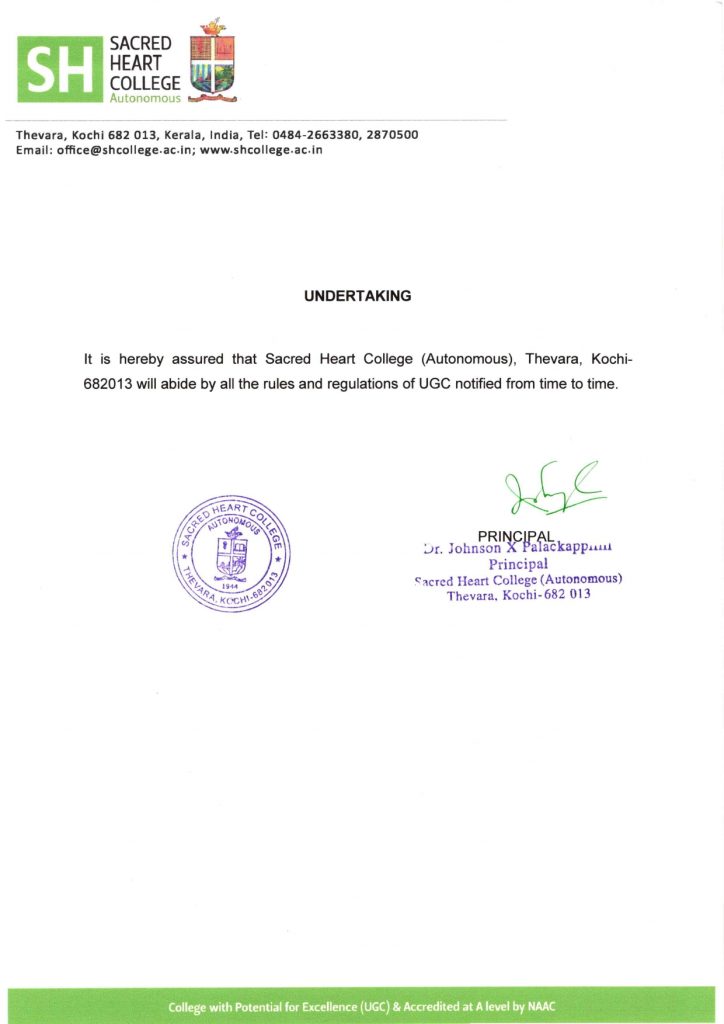
Code of Conduct
The College has designed Code of Conduct to provide fair procedures relevant to all the students, teachers, governing body, administration including principal/ Officials and support staff of the college. All the students of all Undergraduate and Postgraduate programmes and all the M. Phil and Ph. D. scholars of all the departments of the College. All the students, as members of Sacred Heart College, are required to observe all the rules that are proposed under the Code of Conduct of the College. The Code of Conduct relates to three main areas such as (i) Academic integrity, (ii) Classroom Conduct and (iii) Conduct outside Classroom.
Committee to Monitor Code of Conduct
| Franklin J (Coordinator) | |
| Jinu George (Jt. Coordinator) | |
| Fr. Joseph Varghese CMI (IQAC Coordinator) | |
| Syamlal M S (Jt. Coordinator) | Central Campus |
| Fr. Sabu Thomas | |
| Jaison J | |
| James V George | |
| Neenu Mary Francis | |
| Fr. Antony P T CMI (Jt. Coordinator) | Media Campus |
| Roshina Jasmine Faber | |
| Sujith Narayanan | |
| M C Jose (Jt. Coordinator) | East Campus |
| Bony Mathew | |
| Nishal Jayant | |
| Hod/ Class Teachers Concerned | |
| PTA Vice President | |
| Renish P R | |
| Bency Benny |
Policy Documents and Rules for the Code of Conduct
